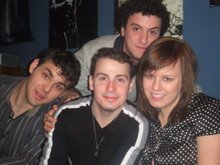Sometime in the near future, Jeff VanDerBeek could be putting out a fire to save lives, and the training he received at Humber College will enable him to do just that.
VanDerBeek was born in Kapuskasing, Ontario, but moved to Kitchener when he was three years old. Before reaching a decision to enroll in the Humber Fire Pre-Service Education and Training program, VanDerBeek says it was a process of far-fetched elimination.
“When I was nearing the end of high school, I was unsure, as were many of my classmates, about what they were going to do. I was trying to think about what the funnest jobs would be and off the top of my head I thought ‘NHL hockey player’, ‘poker player’. Once I got back down to reality and I actually started talking to different people, there were two main influences that lead me to firefighting,” he says.
When VanDerBeek was 12, he was playing ice hockey and got cross-checked in the throat, causing some swelling. His head coach was a firefighter and a paramedic, and he says that his coach was the only one to look objectively at the situation and do something productive. The coach calmed VanDerBeek and this, he says, was admirable.
Another hockey instructor of his used to tell stories about his firefighting profession, stories that VanDerBeek found very entertaining and exciting. But aside from these men, it was his ethics that lead him in the firefighting direction.
“What’s right and moral in regards to your day to day activity, there’s so much grey area. I didn’t want there to be any grey area in my job. I wanted it to be clear cut that what I was doing was a productive thing in society,” he says. “To believe in one thing whole heartedly is a little abstract but there’s nothing abstract about a person helping another person when they need it.”
Regardless of the reasons he chose firefighting, VanDerBeek says he is finding success and happiness in his program. In the first semester, he learned specific aspects such as ventilation and pump operations. Real fire trucks were used to teach the students regulating water pressure and setting up hoses in various manners. VanDerBeek says with the training they are doing now, there is more of a solid education on actually putting out fires.
They are trained at sites called Burn Towers, mock buildings used by fire departments for training new recruits. Humber students are trained in all positions of a fire crew: the crew going in to the building, the entry control team who look after the people going in, and another crew which is dedicated to rehab. VanDerBeek says the rehab crew is as crucial to a firefighting team’s success as any.
“When the crew comes out of a building, (the rehab team) takes vitals, blood pressure, and gives the guys water. In the real world, you can’t just keep sending people in to a long-running fire, eventually they’re going to go down. Those people go to rehab to get vitals down to an acceptable level so they can go back in and continue fighting the fire,” he says.
Humber’s firefighting program is three semesters long, and as excited as VanDerBeek is about obtaining employment at a fire hall, he has other plans for the immediate future. He hopes to go out west to work on the oil rigs before enrolling at Conestoga College for Paramedics.
“It’s all about taking care of patients, packaging, and wound care. That was one of my favourite parts of the firefighting program. Eventually I want to get in to full-time firefighting, that’s my primary goal,” he states. “But the paramedic will help me get there along the way, and I think it’d be a cool part time job. Good money there too. They’ve got benefits that’ll take care of my teeth at least.”
As for now, VanDerBeek plans on wrapping up Humber’s program, including a six-week placement in his third semester, which he hopes he can complete at a fire hall in the Kitchener area. With all he has to look forward to though, he still thinks about the little things.
“Right now, I’m excited about taking a nap,” he says with a smile.
-30-
Subscribe to:
Post Comments (Atom)

No comments:
Post a Comment